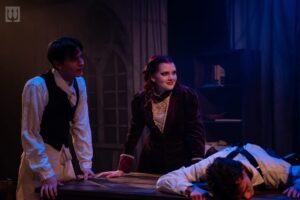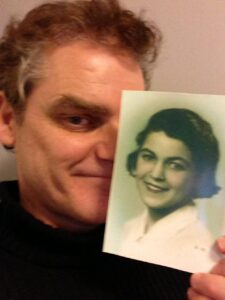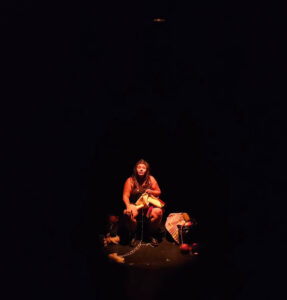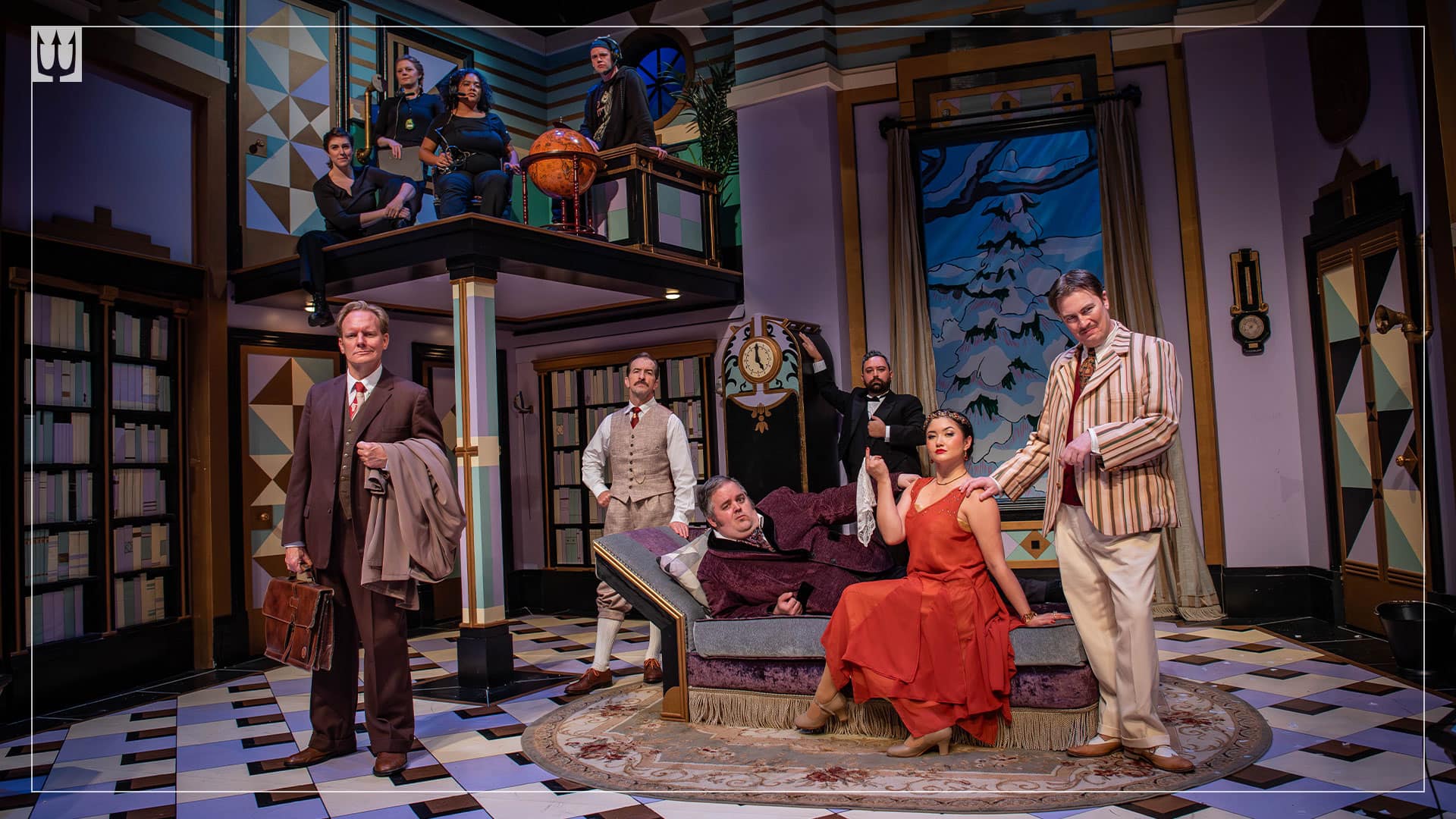
The Cast of The Play That Goes Wrong at Neptune Theatre. Photo by: Stoo Metz.
An Opening Night audience is not always the most accurate barometer for the way a show will be received more broadly, but I think in the case of The Play That Goes Wrong, which opened last night at Neptune Theatre, the audience’s wildly enthusiastic response will remain consistent through the run. I was surrounded by folks who were actually screaming in laughter, and barely able to catch their breaths. Three and a half years into a pandemic that often seems unrelenting Haligonians are certainly overdue for a play that will have them crying with hysterical laughter instead of sorrow.
The Play That Goes Wrong is a contemporary British play by Henry Lewis, Jonathan Sayer, and Henry Shields of Mischief Theatre that is still playing in The West End of London since it opened there in September of 2014. It tells the story of The Cornley Drama Society, a community theatre group, who are mounting their biggest challenge yet, a production of the 1922 murder mystery play The Murder at Haversham Manor. The Drama Society’s cast, under the direction of Chris Bean (played by Jonathan Torrens), have various levels of skill and experience onstage, but all have the utmost of good intentions, and are determined to present this play to their audience, if it literally kills them.
What is interesting about the way this play is constructed is that, while the point of the play is not The Murder at Haversham Manor it is all the stage managers’ nightmares preventing the cast and crew from presenting this play professionally, The Murder at Haversham Manor draws the audience in, and we can clearly follow even the tertiary plot lines of the mystery. This makes the play feel satisfying on a number of different levels, and, in fact, means that The Cornley Drama Society has, in some capacity, succeeded in their goal of bringing this story to life.
In one sense the play is John Dinning’s set’s world, the actors are just living in it. There are so many magical surprises in this show that seem to walk the finest line of being possible (and safe) for our real actors to play on. The set has been described as a character in the play, which it absolutely is, but you also really get the sense of it being alive somehow.
The play is truly an ensemble piece and the entire cast is fantastic. Thomas Gordon Smith plays Jonathan Harris, the actor who largely plays the dead Charles Haversham, but since he is backstage a lot, he can also be seen rushing around frantically trying to help his compatriots as everything onstage goes awry. Smith, who Haligonian audiences know well from his prolific time at Shakespeare By the Sea, knows how to milk every millisecond of his time onstage for maximum silliness. Cynthia Jimenez-Hicks plays Sandra Wilkinson, an ingenue actor with a penchant for flourishes, who ends up having to literally fight to finish the show. Izad Etemadi plays Dennis Tyde, who plays the butler, Perkins, and he has a lot of fun with Tyde’s epic mispronunciations of certain words in his lines. This bit sounds cliché on paper, but in Etemadi’s hands it’s absolutely fresh and hysterical. Similarly, Leah Pritchard’s crew member character, Annie Twilloil, finds herself onstage through a series of mishaps, reading deadpan from the script, which is also way more hilarious than it sounds. Riel Reddick-Stevens plays Trevor, the technician, the character with the firmest boundaries, but who gets sucked into the chaos regardless.
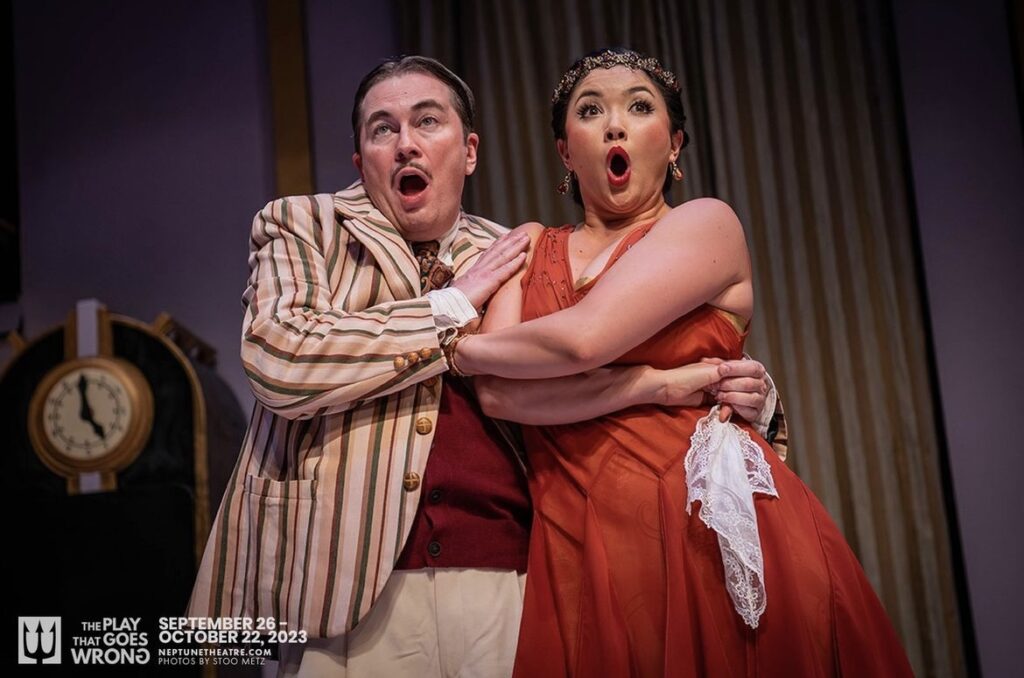
It’s amazing how much nuance is crammed into these beautifully layered performances that on the one hand are so big, broad, and farcical, but on the other, have so much depth and detail. Jonathan Torrens’ Chris Bean is the director of The Murder of Haversham Manor, and also plays Inspector Carter, and you get the sense that Bean would be quite a serviceable actor were he performing under different circumstances. Also, as the director of a community theatre show, his concern for the wellbeing of the rest of the cast also comes out in glimmers through his performance as the Inspector. Similarly, Jeff Schwager’s character Robert Grove seems like he could be a real community theatre star, but that he is a little underrehearsed, and, of course, blindsided by a hundred calamities beyond his control. So much humour in the play comes from the moments when Torrens and Schwager’s characters become exasperated with their situation, but choose to buck up and barrel on through anyway. On the opposite end of the spectrum is Josh MacDonald’s Max Bennett, who is an outrageously novice actor completely out of his depth. One of my favourite moments in the show was right at the beginning when you see Max taking a moment to congratulate himself for saying his line correctly. It’s truly a delicious performance from MacDonald, full of so many little hilariously absurd moments from a character who clearly loves the attention he gets from being in front of an audience, but who has likely never been in front of an audience before. This gigantic performance from MacDonald is beautifully anchored by the more subdued performances, especially of Torrens and Schwager, which makes all three of their characters so hilarious, but in different ways. I suspect the balancing act for director Jeremy Webb was a challenging one, in figuring out where each character lies on the spectrum between Straight Man and Clown, and how each one moves along this spectrum throughout the show. It’s truly a beautiful example of an ensemble working in absolute tandem with one another.
Karen Bassett creates some really fun fight choreography using unexpected props, as is one of her specialties, Helena Marriott’s costumes are Drama Society perfection, and Jordan Palmer’s sound design for The Murder at Haversham Manor is so bad it’s terrific. To create a show that looks like the world is collapsing around the actors requires a more Herculean effort than usual from the real life backstage crew, so a big congratulations also to everyone in the crew on a really seamless job well done.
Overall, beyond the set, so much in The Play That Goes Wrong looks easy, and that is part of what makes it so fun, and so funny. In the audience we are focused on all that is silly and ridiculous and absurd that is happening on the surface for us to delight in and enjoy. In reality, though, the play is so meticulously constructed, and that is a marvel to be appreciated as well.
If you want to laugh until your sides ache, and to be surprised, delighted, and impressed by all the things that could go wildly wrong in a play, head down to Neptune Theatre and buy your tickets for The Play That Goes Wrong!
The Play That Goes Wrong plays at Neptune Theatre (1593 Argyle Street, Halifax) until October 22nd. Performances are Tuesday to Sunday at 7:30pm and Saturdays and Sundays at 2:00pm. Tickets are available online here or by calling the Box Office at 902.429.7070 or visiting in person at 1593 Argyle Street, Halifax.
Special Dates:
SUPPORT FOR CULTURE
INDUSTRY NIGHT:
Tuesday, October 3 – 7:30 pm
TALK BACK NIGHT:
Tuesday, October 10 – 7:30 pm
AUDIO DESCRIBED PERFORMANCE
Thursday, October 12 – 7:00 pm
MASKED PERFORMANCES:
Sunday, October 8 – 2:00 pm & 7:30 pm
Neptune Theatre is fully accessible for wheelchair users. For more Accessibility Information Click Here.


